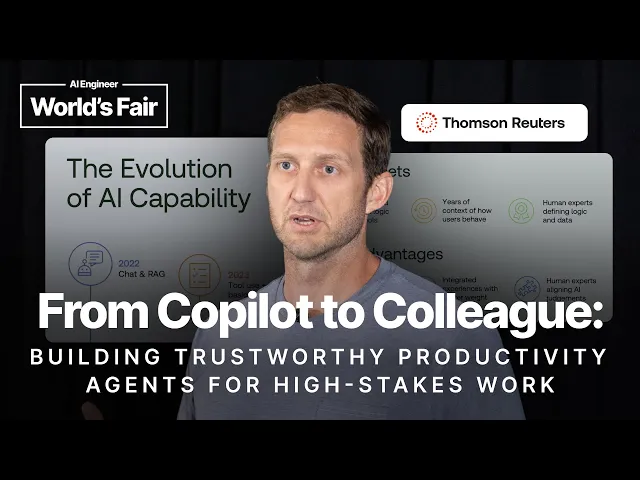From Copilot to Colleague: Building Trustworthy Productivity Agents for High-Stakes Work

From Copilot to Colleague: trustworthy AI at work
In a recent talk, Microsoft's Joel Hron explored the rapidly evolving landscape of AI productivity agents in high-stakes work environments. As organizations increasingly integrate AI assistants into complex workflows, the conversation has shifted from whether to adopt these tools to how to implement them responsibly. Hron's insights offer a valuable framework for thinking about AI tools not merely as task automation systems but as collaborative partners requiring careful design and governance.
Key insights from Hron's presentation:
-
AI agents are evolving from simple tools to collaborative partners, with the potential to handle increasingly complex multi-step workflows and operate with greater autonomy in professional contexts.
-
"Responsible-by-design" principles must be embedded throughout the AI development process, focusing on transparency, explainability, and maintaining human agency in critical decision points.
-
Successful AI integration requires robust governance frameworks, continuous evaluation of both qualitative and quantitative metrics, and careful consideration of what tasks are appropriate for automation versus human judgment.
-
Building user trust is paramount and depends on clear communication about AI capabilities, appropriate oversight mechanisms, and giving users control over how and when AI assistance is applied.
The critical importance of trust in high-stakes AI
Perhaps the most compelling aspect of Hron's talk is his emphasis on trust as the foundation for effective AI deployment. In high-stakes environments like healthcare, legal work, or financial services, users must trust not only that an AI system will perform competently but also that it will operate within appropriate boundaries and with transparent limitations.
This trust challenge arrives at a pivotal moment for enterprise AI adoption. According to recent Gartner research, while 55% of organizations are experimenting with generative AI, many struggle with implementation beyond pilot projects precisely because of trust and governance concerns. The gap between AI's technical capabilities and organizational readiness to deploy them responsibly creates both risk and opportunity.
Beyond the talk: Real-world implementation challenges
What Hron's presentation doesn't fully address are the significant cultural and organizational changes required to implement these principles effectively. Consider the experience of Memorial Sloan Kettering Cancer Center, which implemented an AI system to assist with cancer diagnosis. Their success depended not just on the technical quality of the AI but on a carefully designed workflow that maintained physician
Recent Videos
How To Earn MONEY With Images (No Bullsh*t)
Smart earnings from your image collection In today's digital economy, passive income streams have become increasingly accessible to creators with various skill sets. A recent YouTube video cuts through the hype to explore legitimate ways photographers, designers, and even casual smartphone users can monetize their image collections. The strategies outlined don't rely on unrealistic promises or complicated schemes—instead, they focus on established marketplaces with proven revenue potential for image creators. Key Points Stock photography platforms like Shutterstock, Adobe Stock, and Getty Images remain viable income sources when you understand their specific requirements and optimize your submissions accordingly. Specialized marketplaces focusing...
Oct 3, 2025New SHAPE SHIFTING AI Robot Is Freaking People Out
Liquid robots will change everything In the quiet labs of Carnegie Mellon University, scientists have created something that feels plucked from science fiction—a magnetic slime robot that can transform between liquid and solid states, slipping through tight spaces before reassembling on the other side. This technology, showcased in a recent YouTube video, represents a significant leap beyond traditional robotics into a realm where machines mimic not just animal movements, but their fundamental physical properties. While the internet might be buzzing with dystopian concerns about "shape-shifting terminators," the reality offers far more promising applications that could revolutionize medicine, rescue operations, and...
Oct 3, 2025How To Do Homeless AI Tiktok Trend (Tiktok Homeless AI Tutorial)
AI homeless trend raises ethical concerns In an era where social media trends evolve faster than we can comprehend them, TikTok's "homeless AI" trend has sparked both creative engagement and serious ethical questions. The trend, which involves using AI to transform ordinary photos into images depicting homelessness, has rapidly gained traction across the platform, with creators eagerly jumping on board to showcase their digital transformations. While the technical process is relatively straightforward, the implications of digitally "becoming homeless" for entertainment deserve careful consideration. The video tutorial provides a step-by-step guide on creating these AI-generated images, explaining how users can transform...
